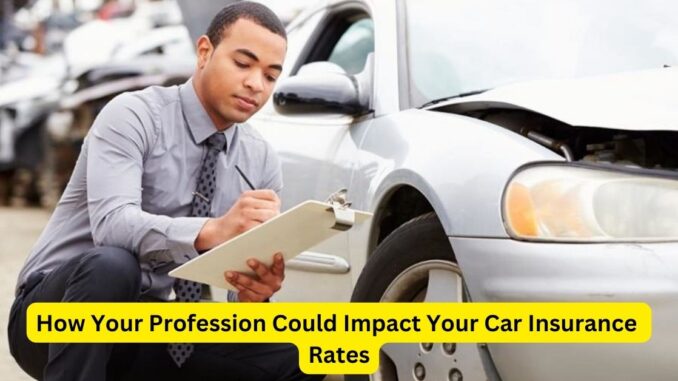
While several factors influence auto insurance premiums, your profession is one element that might not immediately come to mind. Insurance companies often consider occupation when determining rates, as certain professions may be associated with different levels of risk. Understanding how your job can affect your car insurance rates can help you make informed decisions when seeking coverage.
1. Risk Assessment: Insurance companies assess risk based on statistical data, and certain professions may be deemed riskier than others. For example, individuals in professions that involve a significant amount of driving, such as delivery drivers or sales representatives, may be considered higher risk due to increased exposure to potential accidents.
2. Commute Distance: The distance and frequency of your daily commute can impact insurance rates. Jobs that require long commutes or regular travel may result in higher premiums, as the more time spent on the road statistically increases the likelihood of accidents.
3. Vehicle Use for Business Purposes: If you use your vehicle for business purposes, such as commuting to different job sites, carrying equipment, or making deliveries, insurance companies may categorize your vehicle as a commercial vehicle. Commercial use often leads to higher premiums due to the increased risk associated with business-related driving.
4. Job Title and Risk Perception: Insurance companies may evaluate risk based on job titles. For example, professions that are perceived to be high-stress or involve tight deadlines might be associated with higher stress levels on the road, potentially leading to increased accident risk and, subsequently, higher insurance premiums.
5. Working with Specialized Equipment: Occupations that involve the use of specialized equipment or tools may impact insurance rates. For instance, individuals in construction or trades who transport expensive tools or machinery may be subject to higher premiums to cover the potential cost of replacing or repairing specialized equipment in the event of an accident.
6. High-Income Professions: Surprisingly, individuals in higher-income professions may experience higher insurance premiums. Some studies suggest that those with higher incomes may be charged more due to the assumption that they can afford to pay higher rates. However, this can vary between insurance companies.
7. Educational and Professional Background: Insurance companies may also consider your education and professional background when determining rates. Statistical data might suggest that individuals with certain educational or professional qualifications are associated with lower-risk driving behavior, leading to potentially lower premiums.
8. Discounts for Certain Professions: On the flip side, some insurance companies offer discounts for individuals in certain professions. Educators, healthcare professionals, and members of certain associations or organizations may be eligible for discounts based on the assumption that individuals in these professions exhibit safer driving behaviors.
9. Location of Work: The location where you work can also impact your insurance rates. If your workplace is in a densely populated urban area with a higher likelihood of accidents or theft, your premiums may be higher compared to someone working in a suburban or rural location.
In conclusion, your profession can indeed influence your car insurance rates, as insurers use various factors to assess risk. It’s essential to provide accurate information about your occupation when obtaining insurance quotes, and if your profession changes, consider updating your insurance provider accordingly. While you might not have direct control over your job title, understanding how your profession affects your insurance rates empowers you to make informed choices to find the most suitable coverage for your needs.
Leave a Reply